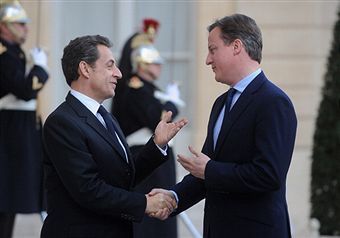 Nicolas Sarkozy is grudgingly admired by French socialists as a political fighter,
capable of thriving even in the most desperate situation. David Cameron is coming to understand what they mean. It is the best of times and the worst of times between Paris and London. Two months
ago, David Cameron and Nicolas Sarkozy assumed the victor’s garlands in Benghazi; today, they met at odds, if not yet in animosity, over the contested logic of ever closer union in
Europe.
Nicolas Sarkozy is grudgingly admired by French socialists as a political fighter,
capable of thriving even in the most desperate situation. David Cameron is coming to understand what they mean. It is the best of times and the worst of times between Paris and London. Two months
ago, David Cameron and Nicolas Sarkozy assumed the victor’s garlands in Benghazi; today, they met at odds, if not yet in animosity, over the contested logic of ever closer union in
Europe.
Sarkozy appears to have got his wish: the 17 countries of the Eurozone will deepen their economic and political relations in an attempt to save the single currency — and with it, he hopes, France’s economic and political strength on the international stage. It is unclear how integration will work, with Angela Merkel adamant that German taxpayers are protected from the excesses of their feckless neighbours. More precise details will likely emerge after Monday’s Franco-German summit; but Sarkozy seems to have preserved France’s seat at Europe’s top table, from which the naysayers are excluded.
Britain’s European seat is much less certain. Earlier in the year, George Osborne hectored the eurozone to follow the remorseless logic of monetary and integrate; the government’s thinking appeared to be that Britain could stand outside mainstream Europe and repatriate certain powers in peace. The government has since realised that it might be permanently exiled from Europe’s economic decision-making unless it become more proactive; it has therefore donned some marigolds and gone back into the mire, first with bilateral talks with Merkel and now with Sarkozy. Today, Cameron insisted that Britain is a ‘big player in the single market’: evidence of the change of emphasis.
But change has come at a cost. David Cameron has forsaken the grand repatriation of powers, having concluded that this is not the moment for confrontation. Instead, as James explained recently, he plans to ‘salami-slice’ concessions from the EU on the Working Time Directive and to protect the financial independence of the City. Above all, he plans to ensure that Britain is not affected by the Eurozone’s fiscal union — a point he made forcefully at the talks today. There are also rumours that Britain desires some oversight over the new-look Eurozone, arguing that this is necessitated by the incestuous economic ties between Europe states; this has some Eurocrats privately asking why Britain doesn’t simply join the single currency and fashion it as the Germans and the French seek to.
Cameron has had some success on the WTD, although there are reports that progress is in jeopardy. He vowed to return to the issue of European competitiveness after the crucial EU summit next Friday and there must be reasonable hope of success now that Sarkozy has pledged to reform the French labour market, which was, of course, a central tenet of his 2007 election campaign.
But there is significant tension between the two countries. Sarkozy has said that European countries should surrender some of their vetoes and grant Brussels some control over their budgets in order to improve the EU’s functions and guard against reckless spending. Those expansive proposals would probably require treaty amendments that might trigger the referendum lock in this country. The recent Europe-squabble in parliament suggests that the government wants to avoid a referendum. Perhaps that is why Cameron appears intent on resisting Sarkozy’s radical ideas. He remarked that integration and further financial measures could be made without a treaty change.
Plainly, the two leaders’ vision of the Europe future differ. This is most apparent over financial regulation. Bagehot, in his Economist column this week, quotes French sources calling it “totally unacceptable” that British banks exist in deregulated competition across La Manche. The Eurozone, France argues, must have oversight of the City and its speculators.
This should be anathema to any British leader; but particularly to Cameron, who has to contend with his mutinous backbenchers. Cameron’s careful policy, on show in Berlin and Paris, may not assuage their concerns. Indeed, dissent was unbridled at a recent party held in honour of Robin Harris, who was once Mrs Thatcher’s adviser. A savage joke about Cameron being resolved only against conviction elicited gleeful cackles from the guests. All in all, it seems very long time since William Hague said that he would ‘not let matters rest’.






Comments